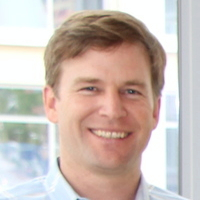Building Credentials, Competencies, and Connections
By: Alec Masella
January 4, 2018

David Robertson, PhD, is the founding director of the Executive Master of Natural Resources (XMNR) graduate degree program and a Senior Fellow and Associate Director at Virginia Tech’s Center for Leadership in Global Sustainability (CLiGS). In a recent interview, he provided some insight to how the XMNR program provides students with not only a graduate degree and an exceptional learning experience but also professional networking opportunities that help students accomplish their career goals.
Since 2010, David has worked with a diverse, interdisciplinary team of faculty to design and build the XMNR program from the ground up. As such, he’s well versed in what makes the program a unique opportunity, including motivated students, exceptional faculty, a collaborative model of instruction, and engaging real-world experiences for grappling with the many facets of sustainability.
David is quick to call attention to the quality of the students who enroll in the program. “Some XMNR students have prior academic and professional experience in this field, while others are seeking to make a significant career change” he says, adding that the program benefits from the students’ wide range of academic, geographic, and career backgrounds.

XMNR applicants must have professional experience to be accepted by the program. This requirement allows XMNR students to complement one another’s skills in the classroom, as well as opening the floor to nuanced, robust discussion about complex sustainability issues, informed by personal experience and diverse perspectives. Teamwork, peer-to-peer learning, and mentoring between students are key to the success of the XMNR curriculum.
The unique hybrid cohort model of the program provides the best of both online and in-person instruction, making graduate education feasible for working adults. Students meet face-to-face one weekend per month for intensive, real-world problem solving, combined with virtual instruction and collaboration between in-person meetings. This interdisciplinary, team-oriented approach translates well to the issues and challenges students face in their professional settings.
Moreover, a sense of community develops over the year-long program and solidifies students’ professional networks. Many XMNR alumni maintain strong connections with other cohort members, faculty, and partner organizations even after the degree program has ended–that’s always been an intentional component of the XMNR and part of what David refers to as The Four C’s that students can expect to gain from the XMNR Program: Credentials, Competencies, Confidence, and Connections.

According to David, “the program is much more integrated and cumulative than a standard graduate program. The students are part of interdisciplinary and cross-cultural learning teams, so it’s an exchanging of strengths and learning from other’s experiences.”
Unlike many graduate programs, the XMNR faculty push students to think and act across professional and institutional boundaries, thereby preparing students to work more effectively with people not like themselves to address more complex and larger scale sustainability challenges. The XMNR program emphasizes development of cross-sector partnering skills, encouraging students to try out perspectives, goals, and concerns that may be quite different from their own and what they are used to from their prior work experience.
“Most of the environmental and sustainability challenges we face today are not the domain of any one profession or sector of society,” David continues. For example, climate and water are transboundary systems that require collaboration between multiple professions, stakeholders, and jurisdictions.
Along with new skills and knowledge for addressing sustainability issues, the XMNR program gives graduates a strong community of individuals and organizations they can reach out to when they need specialized information or support from strategic partners in the future.

“As part of an individual development process that each student completes,” he says, “we actively help students build their professional networks.” In doing so, students graduate from the Center for Leadership in Global Sustainability educated, inspired, and empowered to accomplish their career goals and create a better future for people and the planet.
---

Dr. Robertson, the Associate Director for Executive Programs at CLiGS, received a Ph.D. and Master of Landscape Architecture degrees from Virginia Tech and a B.A. in Art & Architecture from Montana State University. He directs the Executive Master of Natural Resources (XMNR) program, advises students, and teaches courses in sustainable development, urban ecology and environmental governance. He conducts research on green infrastructure systems and sustainable development strategies and has published research in journals such as Society & Natural Resources, Conservation Biology, Ecology & Society, Environmental Management, and Environmental Science & Policy.


